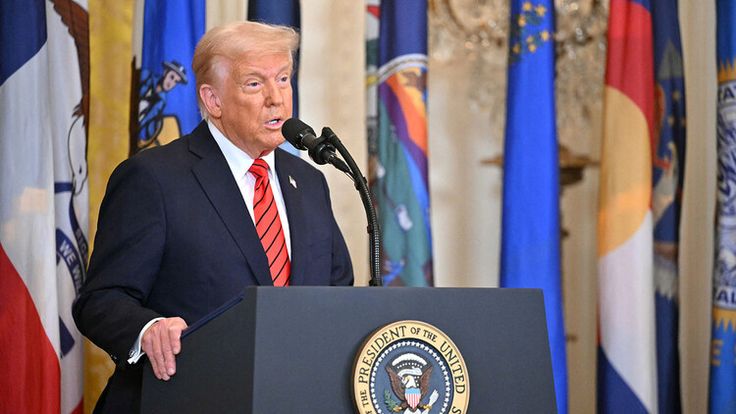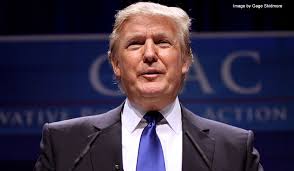|
Getting your Trinity Audio player ready... |
In a bold and charged statement that reignites debates over globalization, former U.S. President Donald Trump launched a sharp criticism at American tech companies for outsourcing jobs to India and establishing manufacturing operations in China. Speaking at a recent AI summit, Trump on US tech jobs made it clear that under his leadership, “those days are over,” signaling a renewed focus on reshoring jobs and promoting American tech industry independence. This strong stance from Trump on US tech jobs highlights his commitment to putting American workers first and reasserting national control over critical technology sectors.
The comments, which quickly went viral, have stirred intense discussion in both political and tech circles, especially among those concerned about the future of US tech jobs and the impact of globalization on American workers.
Trump on US Tech Jobs: A Call for National Loyalty

During the AI-focused event, Trump didn’t hold back. “For too long, our biggest tech firms have abandoned the American worker. They build factories in China, hire staff in India, and stash profits in Ireland,” he said. “Meanwhile, they ignore and censor their fellow citizens at home. Under my presidency those days are over.”
Trump’s remarks align with his long-standing rhetoric against outsourcing and global offshoring strategies, particularly within the tech sector. This speech marks a new chapter in his Trump AI policy, tying economic nationalism with advancements in artificial intelligence.
He added that American technology companies must show full dedication to the nation, saying, “We need tech leaders who put America first not just in slogans, but in action.”
Executive Orders to Shape AI and Tech Future
As part of this renewed focus, Trump signed three major executive orders aimed at boosting the U.S.’s position in the global AI race. These AI executive orders outline a national strategy to promote domestic development, safeguard U.S. AI assets, and enhance technological exports to friendly nations.
One of the orders proposes stricter export controls on advanced AI chips, especially those developed by companies like Nvidia and AMD. This is designed to prevent U.S.-developed technology from ending up in countries seen as national security threats. Trump’s administration also recommended chip location verification, a move applauded by bipartisan lawmakers who have raised concerns about sensitive tech reaching nations like China.
This strategic blueprint is part of a broader push to stimulate investment in American data centers, ease environmental regulations to accelerate AI infrastructure, and encourage public-private partnerships.
Outsourcing to India Criticism Raises Eyebrows
Trump’s direct criticism of outsourcing to India has reignited long-standing concerns among tech industry leaders and policy experts. While India has been a vital partner in IT and software development for decades, Trump’s stance reemphasizes a vision of self-sufficiency where critical tech functions are kept within U.S. borders.
“Every job we send overseas weakens our foundation at home,” Trump said. “We need to build, hire, and grow right here in the United States. That’s how we win.”
This marks a significant stance in the ongoing debate over outsourcing, especially as companies continue to expand globally to cut costs and tap into specialized talent.
Trump on Silicon Valley: Time to Reclaim American Innovation
Beyond outsourcing, Trump pointed fingers at Silicon Valley, accusing major tech firms of placing profits over patriotism. “Silicon Valley has lost its way. It used to be the heart of innovation now it’s the hub of political bias and globalist interests,” he asserted.
This rhetoric aligns with broader conservative critiques that argue tech companies have become too powerful, too politically active, and too detached from the average American citizen. Trump is positioning himself as a corrective force, someone who can return the tech sector to its “original mission” of serving American needs.
With the 2025 presidential race heating up, his remarks also serve a strategic purpose reigniting his base’s support by blending economic, national security, and tech-related concerns into one sharp narrative.
What This Means for American Tech Companies Abroad
Trump’s comments are a wake-up call for American tech companies abroad, many of which have deeply entrenched global operations. From customer support centers in India to production lines in Southeast Asia and profit routing through Ireland, the global tech economy is vast—and complex.
However, Trump argues that this structure, while financially efficient, comes at the cost of American jobs and security.
“Bringing tech jobs back to America isn’t just good economics it’s a matter of national strength,” Trump said.
US Tech Jobs News: What Comes Next?
Trump’s remarks have already impacted US tech jobs news cycles, drawing mixed reactions from economists, executives, and workers. Some argue that reshoring jobs could raise costs and limit access to global talent. Others believe it’s a necessary shift to rebuild the American middle class and ensure tech sovereignty in an age dominated by artificial intelligence and data warfare.
In any case, the message is clear: a second Trump term would likely come with aggressive policies aimed at forcing tech companies to reallocate jobs and investment within U.S. borders.







